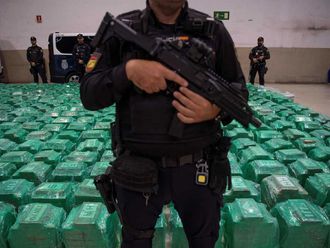
A former US police officer convicted of hiring the hitman who killed his wife almost 30 years ago was executed Tuesday after a last minute legal battle, Texas authorities said.
Robert Fratta, 65, had been scheduled to be put to death Tuesday evening, but a Texas judge's ruling threw the planned lethal injection into doubt for several hours.
After an emergency hearing Tuesday morning, District Judge Catherine Mauzy ruled that officials could not use the intended drug because it was "probably illegal to possess or administer because it is more likely than not expired."
Fratta had filed the last-minute appeal along with multiple other death row inmates, arguing that the use of expired pentobarbital constituted cruel punishment and should therefore be blocked under the US Constitution.
However, the Texas Court of Criminal Appeals had previously put limits on judges halting executions, and on Tuesday it overturned Mauzy's ruling.
The southern state's Supreme Court chose not to intervene, allowing the lethal injection to go forward.
A statement Tuesday night from the Texas Department of Criminal Justice said that Fratta had been pronounced dead at 7:49 pm and had not made any final remarks.
Fratta had been in jail since 1994, when, according to prosecutors, he recruited an acquaintance who hired a contract killer to kill Farah Fratta, 33.
According to legal documents, the spouses were in the middle of a bitter divorce and fighting over custody of their three children.
Robert Fratta "solicited many of his friends and acquaintances to kill her or to recommend someone who could kill her," court documents say.
"Initially, most of his friends thought that he was joking or blowing off steam, but as he continued to talk about it over time, some of them came to believe that he was serious."
Robert Fratta enlisted a man from his gym who then hired a hitman. According to US media, Fratta paid the hitman $1,000 for his wife's murder.
Fratta was first sentenced to death in 1996, but the verdict was overturned in 2007 over a technicality. He was resentenced to death in a second trial in 2009.
His lawyers had filed multiple unsuccessful appeals, even to the US Supreme Court, to halt Fratta's execution, alleging that testimony from a witness in the trial was obtained using hypnosis.
Pentobarbital is in short supply in the United States because pharmaceutical companies, not wanting to be associated with the death penalty, have limited production.
Fratta is the second death row inmate to be executed in the United States this year.






